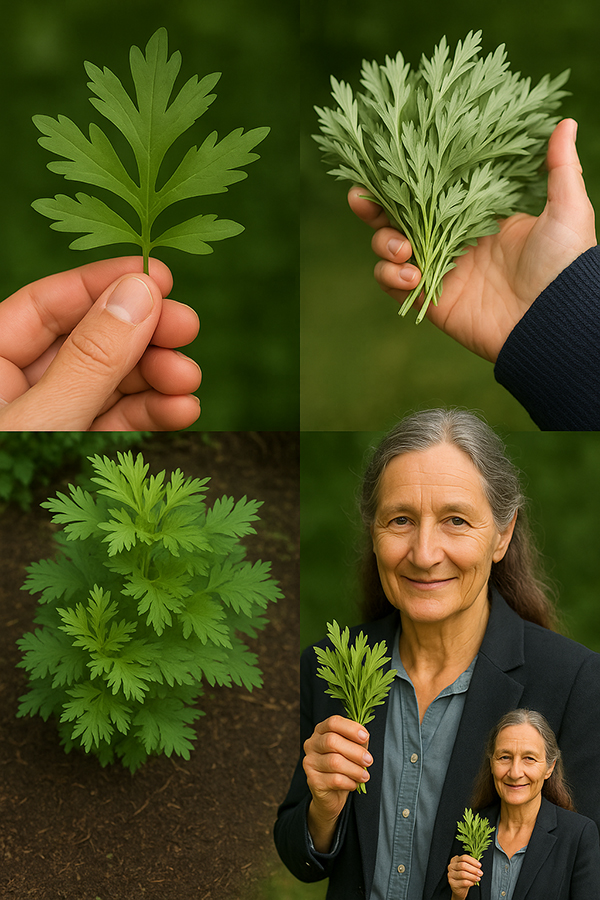In an age where modern medicine dominates the healthcare landscape, certain traditional remedies are making a well-deserved comeback. One such botanical is mugwort (Artemisia vulgaris)—a plant long overlooked by many but treasured for centuries in herbal medicine traditions across Asia, Europe, and North America.

Often dismissed as a roadside weed, mugwort is in fact a potent therapeutic herb with applications that span digestive health, dermatological conditions, hormonal balance, and mental wellness. As researchers and herbalists continue to explore its pharmacological potential, mugwort is emerging as a valuable tool in natural health care.
Below, we explore the medicinal legacy, health applications, and safety considerations associated with mugwort, based on both traditional use and emerging scientific understanding.
🌍 Cultural and Historical Use of Mugwort
Historically, mugwort held spiritual and medicinal significance in various cultures:
-
In Traditional Chinese Medicine, mugwort is used in moxibustion therapy to stimulate circulation and support internal energy (Qi).
-
In European folk medicine, it was brewed to ease stomach complaints and carried for protection during travel.
-
Indigenous communities in North America used it for digestive discomfort, fever reduction, and ceremonial purposes.
Its broad utility made it a cornerstone herb in pre-modern healing systems, and its use is now being revisited in evidence-informed herbalism.
🍽️ 1. Digestive Support
Mugwort acts as a mild bitter tonic, stimulating bile flow and gastric secretions. This makes it beneficial for:
-
Indigestion
-
Bloating
-
Flatulence
-
Occasional constipation
How to Use:
-
Steep 1 tsp of dried mugwort leaves in hot water for 10 minutes.
-
Drink before or after meals, up to twice daily when digestion feels sluggish.
Mechanism of Action:
Compounds such as flavonoids and sesquiterpene lactones are thought to stimulate digestive secretions and muscle tone in the gastrointestinal tract.
🧴 2. Topical Relief for Skin Irritations

Thanks to its anti-inflammatory and antimicrobial properties, mugwort has been traditionally applied to:
-
Eczema
-
Contact dermatitis
-
Bug bites
-
Minor burns or rashes
Application Methods:
-
Crush fresh leaves and apply directly to inflamed skin.
-
Infuse dried mugwort in a carrier oil (e.g., olive oil) over low heat for 3–4 hours, then strain and use topically.
Active Compounds:
Mugwort contains essential oils (e.g., cineole, camphor) and polyphenols that help calm inflammation and reduce microbial load on the skin.
💃 3. Menstrual and Hormonal Support
Mugwort has traditionally been used as an emmenagogue—a substance that stimulates menstrual flow. It may be helpful for:
-
Irregular periods
-
Mild menstrual cramps
-
Perimenopausal symptoms
How to Use:
-
Brew a mild tea with ½ to 1 tsp dried mugwort.
-
Drink once daily in the week before menstruation.
⚠️ Important: Due to its uterine-stimulating effects, mugwort should not be used during pregnancy or by individuals with hormone-sensitive conditions unless under medical supervision.
🦠 4. Antimicrobial and Antifungal Protection
Studies have shown that mugwort exhibits broad-spectrum antimicrobial activity, inhibiting the growth of:
-
Staphylococcus aureus
-
Candida albicans
-
Dermatophytes (fungi that cause skin infections)
Recommended Uses:
-
Add to herbal foot baths to manage athlete’s foot.
-
Prepare a cooled decoction to clean minor wounds or skin infections.
-
Blend with calendula or thyme in natural antiseptic formulations.
😌 5. Nervous System and Sleep Support
Mugwort contains volatile oils with mild sedative and anxiolytic effects. Traditionally, it is used to:
-
Promote relaxation and stress relief
-
Improve sleep quality
-
Enhance vivid dreams, hence its nickname “dream herb”
Ways to Use:
-
Drink a mild mugwort tea 30–60 minutes before bed.
-
Place dried mugwort leaves in a sachet under your pillow.
-
Add to a warm bath or herbal steam to calm the nervous system.
⚠️ Safety and Contraindications
Despite its therapeutic potential, mugwort should be used mindfully.
Precautions:
-
Pregnancy: Avoid use due to its potential to stimulate the uterus.
-
Allergies: Those allergic to ragweed or related plants may react to mugwort.
-
Medical Conditions: Consult a healthcare provider before use if taking medications or managing chronic illness.
-
Topical Use: Conduct a patch test before applying mugwort-infused products to the skin.
-
Dosage: Excessive intake may cause nausea, dizziness, or nervousness in sensitive individuals.
🌿 Conclusion: A Resilient Herb with Renewed Relevance
Mugwort (Artemisia vulgaris) stands as a powerful, yet underutilized, plant in the realm of integrative health. With a rich history of traditional use and growing scientific interest, this botanical offers evidence-backed benefits for digestion, dermatology, women’s health, and stress resilience.
Whether used in teas, oils, balms, or bath blends, mugwort offers a natural, multi-targeted approach to everyday health challenges—reminding us that some of the most effective remedies are growing quietly at our feet.
